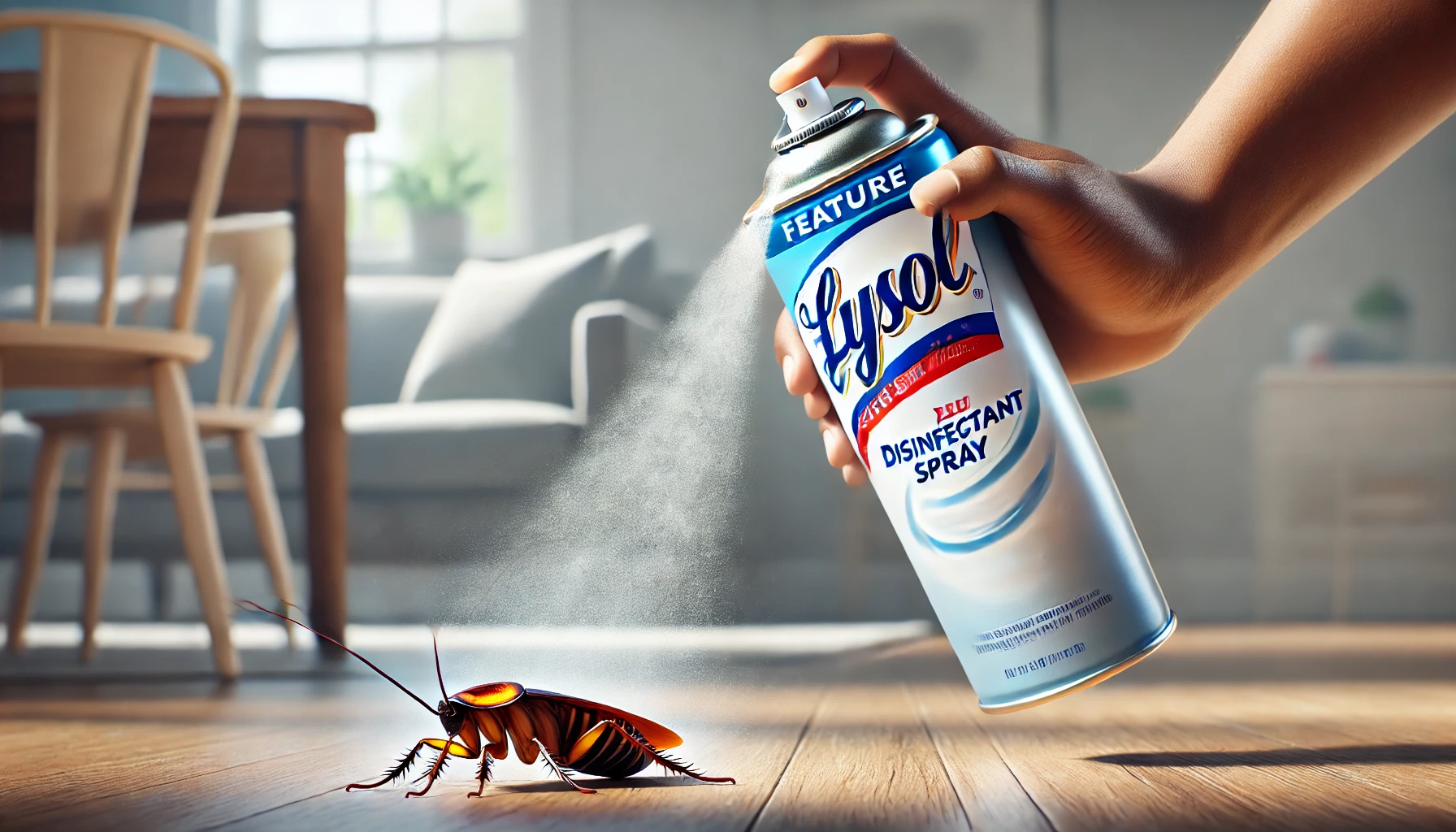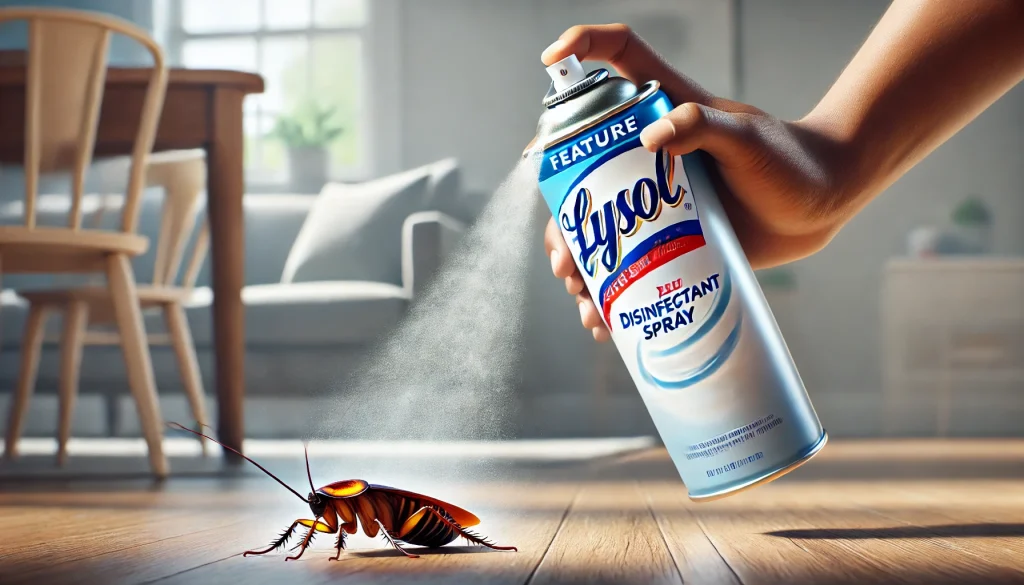
If you’ve ever encountered a cockroach scurrying across your kitchen floor or bathroom counter, you’re probably familiar with the urge to eliminate the pest immediately. Many people reach for household cleaning products like Lysol, hoping to rid their space of these unwelcome invaders. But can Lysol kill a roach, and if so, is it an effective long-term solution? This detailed guide will explore how Lysol works on cockroaches, when it’s useful, and alternative methods for tackling a roach problem in your home.
Does Lysol Kill Cockroaches?
Yes, Lysol can kill cockroaches, but it’s not specifically designed for that purpose. Lysol is primarily a disinfectant used to kill bacteria, viruses, and germs on surfaces. However, its chemical composition can also affect cockroaches by suffocating them and interfering with their breathing system.
How Lysol Works on Roaches
Lysol doesn’t kill cockroaches in the same way that specialized insecticides do. Rather, it works as a contact kill, meaning it needs to make direct contact with the cockroach to be effective. When sprayed, it can clog the spiracles (breathing holes) of the roach, suffocating it. While Lysol is capable of killing individual roaches in this way, it is not a reliable solution for larger infestations or long-term control.
How Does Lysol Kill Roaches?

Lysol works on cockroaches through its chemical ingredients, which disrupt the insect’s physiology in a few ways. Let’s break it down:
Attacking Their Nervous System
Lysol contains ethanol and quaternary ammonium compounds, which can disrupt the cockroach’s nervous system. These chemicals can cause paralysis or confusion in roaches, making them unable to escape from danger.
Blocking Their Spiracles
One of the primary ways Lysol kills cockroaches is by blocking their spiracles—tiny openings on the insect’s exoskeleton that they use to breathe. When these spiracles are blocked by the chemicals in Lysol, the roach suffocates and eventually dies from oxygen deprivation.
When Lysol Can Be Effective Against Roaches
While Lysol can kill roaches in certain circumstances, it’s far from a comprehensive solution. Here’s when Lysol might work:
When Lysol Works:
- Direct Contact: If you see a cockroach scuttling across your floor or counter, Lysol can kill it quickly when sprayed directly onto the insect.
- Immediate Action: If you need an immediate fix to kill a roach in your home, Lysol can act as a temporary solution until you use more targeted methods.
When Lysol Fails:
- Infestations: Lysol can kill roaches that are visible, but it doesn’t address the root of the problem, such as hidden nests or roach eggs.
- Long-Term Prevention: Without residual effects, Lysol won’t stop new cockroaches from entering your home or prevent a recurrence of the problem.
Lysol vs. Insecticides for Roaches: Which is Best?
When it comes to tackling a cockroach problem, you have several options—Lysol or dedicated insecticides. Here’s a comparison of both:
Lysol: Pros and Cons
Pros:
- Quick kill: Lysol can kill a roach almost instantly when sprayed directly on it.
- Multi-purpose: Besides killing roaches, Lysol disinfects surfaces and kills germs.
- Easy to use: Lysol is a common household product, so it’s easy to find and use.
Cons:
- Temporary solution: Lysol only kills roaches on contact and doesn’t provide long-term control.
- No effect on eggs: It won’t kill roach eggs or deal with hidden infestations.
- Health hazards: Inhaling Lysol fumes can be harmful, and it’s not safe for pets, especially cats.
Insecticides: Pros and Cons
Pros:
- Targeted: Insecticides like sprays, baits, and traps are designed to kill cockroaches effectively and provide long-lasting control.
- Kills eggs and nymphs: Many insecticides can kill roach eggs and prevent the infestation from growing.
- Residual effects: Some insecticides leave a residue that continues to kill cockroaches for days or weeks after application.
Cons:
- Chemical exposure: Insecticides can be harmful if not used properly, especially around children and pets.
- Can be toxic: Some insecticides are toxic to humans and pets, requiring careful application and ventilation.
What Should You Use?
For an immediate kill, Lysol can be used, but it’s not the most effective long-term solution. For long-term roach control, it’s best to use professional insecticides, bait stations, or seek help from a pest control expert.
Things to Keep in Mind Before Using Lysol for Roaches
While Lysol can kill roaches on contact, there are several important considerations to keep in mind before using it as a pest control solution:
- Health Risks: Lysol contains chemicals that can irritate the respiratory system if inhaled in large quantities.
- Pets: Avoid spraying Lysol in areas where pets, especially cats, spend time. The chemicals can be harmful to them.
- Food Safety: Do not spray Lysol directly onto food or food prep areas, as the chemicals are not food-safe.
- Effectiveness: Lysol is a short-term fix, and it doesn’t address the root cause of a cockroach infestation.
How to Use Lysol Spray for Roaches
If you decide to use Lysol to kill roaches in your home, here’s how to do it safely:
Materials Needed:
- Lysol Disinfectant Spray (Original or any other type)
- Gloves (optional)
- Paper towel or cloth
Instructions:
- Locate the Roach: First, spot the cockroach and determine where it’s located.
- Spray Lysol: Hold the can about 6-8 inches away from the cockroach and spray it directly. Make sure to cover the roach’s body completely.
- Wait for the Kill: Within a few seconds to a minute, the cockroach will begin to show signs of paralysis and eventually die from suffocation or chemical poisoning.
- Clean Up: After the roach is dead, clean the area with a paper towel or cloth to remove any residue.
Alternatives to Lysol for Roach Control
If you’re looking for a more effective and long-lasting solution, here are some alternatives to Lysol:
Roach Bait Stations
Bait stations contain food laced with poison that roaches carry back to their nests. This can help eliminate entire colonies, including roaches that are hiding in cracks or behind walls.
Insect Growth Regulators (IGRs)
IGRs prevent cockroaches from maturing or reproducing, disrupting their lifecycle and eventually reducing the population.
Professional Pest Control
If your home has a severe roach infestation, professional pest control services may be necessary. They have access to stronger chemicals and advanced methods for eliminating roaches.
Pros and Cons of Using Lysol for Cockroaches
Pros:
- Quick, immediate action
- Can be used as an emergency solution
- Multi-purpose (disinfectant)
Cons:
- Doesn’t address the root cause of infestations
- No residual effects to prevent future infestations
- Not safe for pets or food prep areas
- Limited effectiveness against large infestations
Wrapping Up: Is Lysol a Good Solution for Roaches?
While Lysol can kill a cockroach on contact, it’s not a reliable or effective solution for long-term pest control. It’s best used as a quick fix if you encounter a roach but won’t solve a larger infestation. For long-term roach control, consider using insecticides, roach baits, or seeking professional pest control services.
FAQs
How Long Does It Take for Lysol to Kill Roaches?
Lysol usually kills cockroaches within a few seconds to a minute, depending on how directly the spray contacts the roach.
Why Can’t Roaches Survive Lysol?
Lysol suffocates cockroaches by blocking their spiracles, the breathing holes on their exoskeleton. Additionally, the chemicals can disrupt their nervous system and cause dehydration.
Is Lysol Safe for Pets?
Lysol is not safe for pets, especially cats. It’s essential to keep pets away from sprayed areas until they are dry and ventilated.
Can Lysol Be Used to Eliminate a Roach Infestation?
Lysol is not a solution for infestations as it only kills roaches on contact. For infestations, more targeted solutions, such as bait stations or insecticides, should be used.





4 Comments
This blog is loaded with valuable information, thanks for sharing.
I just like the helpful info you provide in your articles. I will bookmark your blog and test again here frequently.
I am slightly certain I will be told lots of new stuff right right here!
Best of luck for the next!
This article provided me with new ideas on the topic, thank you.
Your post offers some useful advice on the subject. Thanks for sharing your expertise with us.